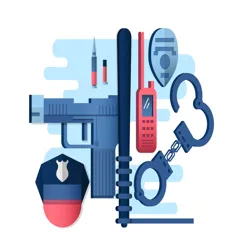According to Forbes, Americans purchased approximately 19.9 million firearms in 2021.[1]Forbes. “U.S. Bought Almost 20 Million Guns Last Year — Second-Highest Year On Record.” Accessed September 26, 2044. If you’re looking to get in on the action, the first thing you will need to do is apply for and obtain an FFL. An FFL is a federal license needed for a firearms business in any state. It grants you the right to sell, import, and manufacture firearms in the United States. In this article, we’ll explain what an FFL is, how to get an FFL in Georgia and walk through the federal firearms license requirements and costs.
Getting a Georgia FFL: An Introduction
A Federal Firearms License or FFL is a document the federal government issues that lets individuals and businesses partake in the firearms industry. In this case, the ATF, or Bureau of Alcohol, Tobacco, Firearms, and Explosives, is the federal agency in charge of setting the general rules and regulations around the licensing process and issuing FFLs to successful applicants.[2]ATF. “ATF.” Accessed September 26, 20244.
Getting an FFL in Georgia can be done in five easy steps. Once you have your FFL, you can take part in the firearms industry as a manufacturer, seller, or importer. Let’s dive into the federal, state, and local requirements you’ll need to meet to be eligible for an FFL.
Step 1: Meet All of the FFL Requirements
The first step in getting an FFL license in Georgia is making sure you can pass all federal requirements. The ATF has set a minimum standard that all individuals must pass to be eligible for an FFL. However, the federal government has left it up to individual states to impose additional licensing restrictions and regulations if they see fit. Below, we look at each level of requirements, from federal to state and local to Georgia.

Federal requirements
The federal requirements for an FFL are pretty straightforward. The federal government wants to make sure you are at least 21 years old, legally able to possess a firearm, have a clean background, and are a US citizen or permanent resident.

State requirements
When obtaining an FFL, the state’s requirements are where it can start to get a little tricky. This is because each state is able to impose its own rules and regulations on the firearms industry, and they can vary drastically. Luckily, Georgia does not have super strict licensing requirements, but they do go beyond the federal government’s minimum threshold requirements. We can break down Georgia’s additional FFL requirements into two categories: licensing requirements and business requirements.
Georgia State Licensing Requirements
In order to operate a firearms business in Georgia, the state also requires you to get a state firearms license. Georgia requires this license for anyone or any business selling handguns under the length of 15”.

When applying for a state firearms license, you must send your application with a copy of your FFL and the $25 application fee. You must also include an extra $3 for each employee. This application is valid from June 1 to July 30 of the following year and must be renewed each year.
The address for your application is P.O. Box 1456, Atlanta, GA, 30371-1456.
Business Requirements
In addition to a Georgia firearms license, you must also register your business with the state of Georgia. You’ll need to fulfill this requirement before you submit your Georgia FFL application. Even if your business is registered in another state, you will need to register it in Georgia to apply for an FFL.

Local and zoning requirements
As is true for any state or locality, you may have trouble getting zoned correctly. This is usually because of a misunderstanding about what it means to operate a firearms business. Many zoning committees will hesitate to give you permits in high-traffic zones or as a home-based FFL. In these cases, you may have to explain how your business really operates (including the amount of traffic you will actually have). All in all, you should be able to get past the zoning hurdle to start a firearms business in Georgia.
Step 2: Select the Type of FFL You Need
Once you confirm your eligibility, it is time to decide what federal firearms license you will need for your business. There are nine different FFLs, so you will have to make some business decisions to decide which FFL type is really best for your situation. In this process, you should consider the following:
- The firearms you plan to sell: Are you going to focus on handguns, rifles, or a more specialized weapon like a machine gun? Or will you focus more on accessories and ammunition? Your answer to this question will help determine which FFL you need.
- Business plan: Are you looking to manufacture weapons, import them, or sell them? You may also plan on combining one or more. Regardless, you will need to decide before choosing an FFL.
- Location: Are you going to focus on an e-commerce store, home-based FFL, or a brick-and-mortar location?

FFL license types
Once you have answered the questions above and have a clear business model, then you can choose the FFL that will best suit your business. You will have nine different FFLs to consider, and they fall under the categories of importing, selling, and manufacturing.
Step 3: Complete an Online FFL Course
If you’re looking to become a licensed firearms dealer, an online FFL course is a great place to start. You’ll learn about the laws and regulations surrounding firearm sales, including the necessary paperwork and background checks. You’ll also get insight into running a successful business, from keeping inventory to handling customer service. There’s also important information on gun safety, procedures, and proper storage. With a combination of informational lessons and practical exercises, an online FFL course offers everything you need to become a responsible and successful firearms dealer.
An FFL course is not required to get an FFL in Georgia, but we see no reason not to take an online FFL course and get ahead of your competition. It could also help keep you out of legal trouble in the future.
Step 4: Apply for Your Georgia FFL
Once you have all your documentation and requirements met, it’s time to finally apply for your Georgia FFL. You will submit your application to the Bureau of Alcohol, Tobacco, Firearms, and Explosives (ATF) with the following documentation:
- Fingerprints: To conduct a criminal background check.
- Photographs: To create your FFL license.
- A completed application for a Federal Firearms License: To get your FFL license approved.
Step 5: Have an Interview with a Representative From Your Regional ATF Office
The fifth and final step before getting an FFL in Georgia is to have an interview with a representative from your regional ATF office. An Industry Operations Investigator (IOI) will do this interview with you. They will check to make sure that you clearly understand federal and state laws regarding the firearms business, that your chosen location suits the purpose, and to make sure you have a coherent business plan.
FFL License Costs in Georgia
The ATF also sets the standard fees for each license. The cost of each FFL varies by license, but the price is standard across all 50 states.
Getting a Federal Firearms License in Georgia: Closing Thoughts

The firearms industry is booming, and Georgia is a great place to apply for an FFL. Although they have a yearly additional licensing procedure, it’s relatively inexpensive and straightforward. If getting into the firearms industry is a career move you want to make, then Georgia is a great place to start.
After you get your FFL, your next challenge will be securing payment processing. The firearms industry is considered high-risk because of all the regulations surrounding it. Your best bet is to set up a high-risk merchant account with a gun-friendly merchant service provider so you can accept payments hassle-free. Contact us today to see what we can do for you!
High-Risk Businesses Wanted
Your troubles of getting approved are over!
Approval
Rating
FFL Georgia FAQs
Do I need an FFL in Georgia?
Yes. In order to engage in the sale, manufacturing, or importing of firearms in Georgia, you will need a federal firearms license (FFL).
Who can apply for an FFL in Georgia?
Anyone who meets the federal requirements is eligible to apply for an FFL in Georgia. The full list is linked earlier in the article.
Do I need to register as a business to get a Georgia FFL?
Yes. Like all new businesses, you will have to register with the state of Georgia to get an FFL. Note: you will need to have your business registered before you submit the FFL application to the ATF.
How can I find an FFL dealer in Georgia?
Finding a federal firearms license (FFL) dealer in Georgia is pretty straightforward. Here are three ways to find one:
- ATF website. The easiest and most reliable way is to go on the Bureau of Alcohol, Tobacco, and Firearms (ATF) website and use their online search tool. Just select “Georgia” from the dropdown menu and hit search. You can also narrow your search by adding specific details such as the city or type of license held by the dealer.
- Directories. Another option is to use a directory like FFLGunDealers.com, which allows you to search for FFL dealers by state and specific categories, such as firearm transfers or ammunition sales.[3]FFLGunDealers.com. “FFL GUN DEALER DIRECTORY.” Accessed September 26, 2024
- Ask your network. Finally, someone you know may have experience with a dealer in your area – ask around to see if your network has any good suggestions.
Keep in mind that not all FFL dealers may offer the same services, so it’s important to call ahead or visit their website before making the trip.
Can you have a home-based FFL in Georgia?
Yes, home-based FFLs are allowed in Georgia. You may have to work with your local zoning department to get approval, but they are allowed at the state level.
Can I apply for an FFL with a Georgia gun trust?
No, a gun trust cannot be used to apply for a federal firearms license. You may, however, be able to use a gun trust to apply for an FFL transfer.
Does the BATF&E have requirements for an FFL in Georgia?
Yes, the BATF&E stands for the Bureau of Alcohol, Tobacco, Firearms, and Explosives. This is the federal agency that sets the minimum requirements for all FFL applicants across all 50 states.
Do I need to apply for an SOT for my Georgia FFL?
If you plan on dealing in or manufacturing firearms and/or ammunition, or if your business includes the use of NFA-regulated items like silencers and short-barreled rifles, then yes, you need to apply to become a special occupational taxpayer (SOT).[4]ATF. “Which firearms are regulated under the NFA?” Accessed September 26, 2024 However, if you’re just a regular gun dealer or gunsmith, then it isn’t required.
How long does it take to get your FFL in Georgia?
Once you have your application submitted, you should find out about your FFL application within 60 days.
How can I transfer an FFL in Georgia?
You cannot transfer an FFL in Georgia, or any other state for that matter. Each individual or business that wishes to partake in the firearms industry must apply for their own FFL.
How much does an FFL transfer cost in Georgia?
It can be tricky to determine the cost of an FFL transfer in Georgia, as each pawn shop or gun dealer sets its own prices. Generally speaking, though, you can expect to pay around $25-$50 for the transfer fee. However, this doesn’t include the cost of background checks or other necessary paperwork, so the total cost could be higher.
How hard is it to get an FFL in Georgia?
Georgia is a relatively simple state in which to get an FFL. They have implemented one additional licensing step requiring paperwork that must be filled out each year. It costs $25, but other than that, you just need to pass the federal requirements. The additional licensing should not be a deterrent for anyone looking to get into the firearms industry in Georgia.




